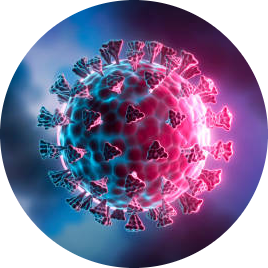The link between long-COVID and Histamine
The link between long-COVID and Histamine is already apparent. Long-COVID is also referred to as ‘post-COVID syndrome.’ It is defined as symptoms that develop during or following an infection consistent with COVID-19 and persist for more than 12 weeks and cannot be explained by an alternative diagnosis.

Studies show that COVID-19 has similar symptoms to the symptoms of Mast Cell Activation Syndrome (MCAS) and Histamine Intolerance. Therefore treatment of MCAS or HIT can be a possible treatment also for COVID.
There is a growing number of people with long-covid, and their symptoms present in some ways similar to patients with mast-cell-driven inflammation.
Symptoms of long-COVID
Breathlessness, cough, chest pain, palpitations, tachycardia, brain fog, loss of memory, loss of concentration, sleep disturbance, headache, numbness, dizziness, abdominal pain, nausea, diarrhea, reduced appetite, fatigue, fever, joint pain, loss of taste and smell, muscle pain, symptoms of depression, anxiety, tinnitus, sore throat, skin rashes
Prevalence of Long-COVID
“37.7% of the participants reported one or more symptoms lasting 12 weeks or more” (1) and one-third of the participants reported that their Long COVID symptoms significantly affected their daily lives.
Covid and Histamine
There is limited guidance on managing Long COVID, but some doctors have started suggesting a low histamine diet. This recommendation is because COVID-19 symptoms have similarities to the symptoms of MCAS (Mast cell activation syndrome) and Histamine Intolerance.
Mast cell activation syndrome is a complex condition whereby mast cell releases mediators (such as histamine) in response to some kind of triggers, which causes a wide range of symptoms affecting multiple body systems. According to the theory, MCAS could trigger long-COVID symptoms, where mast cells release excess histamine in response to viral infection.
One study suggests that hyperinflammation in COVID-19 can lead to dysfunctional mast cells or mast cell degranulation when mast cells release inflammatory mediators.
Low Histamine Diet
The low histamine diet can help in managing Long COVID; however, if mast cells release too much histamine, the diet won’t be enough. If someone is eating a low-histamine food, their symptoms will improve but won’t disappear for long, and there is not enough evidence to suggest this will be helpful for everyone. There are studies on the effect of the natural antihistamine Quercetin, which is a good antihistamine in the case of long Covid.
Covid and antihistamines
Early treatment of symptomatic COVID-19 patients with antihistamines and azithromycin, had excellent outcomes.
COVID and QUERCETIN
In the covid patient group receiving Quercetin, laboratory markers and results showed improvement after the administration of Quercetin. Quercetin, as a common flavonoid of many fruits and vegetables such as high capers, lovage, and tea (Camellia sinensis), is proven to inhibit SARS-CoV-2 binding to the human cell via virus-specific protease and viral S-protein S-human ACE-2 interface (Nair et al., 2002; Uchida et al., 2011; Gormaz et al., 2015).

